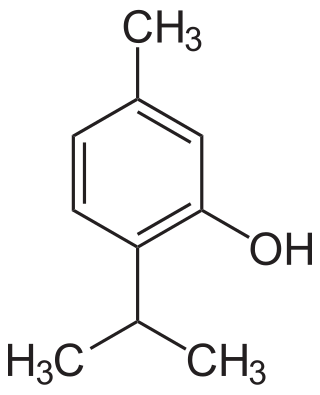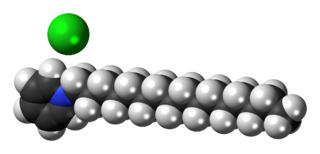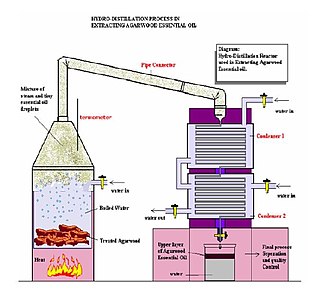Related Research Articles

Dichlorodiphenyltrichloroethane, commonly known as DDT, is a colorless, tasteless, and almost odorless crystalline chemical compound, an organochloride. Originally developed as an insecticide, it became infamous for its environmental impacts. DDT was first synthesized in 1874 by the Austrian chemist Othmar Zeidler. DDT's insecticidal action was discovered by the Swiss chemist Paul Hermann Müller in 1939. DDT was used in the second half of World War II to limit the spread of the insect-borne diseases malaria and typhus among civilians and troops. Müller was awarded the Nobel Prize in Physiology or Medicine in 1948 "for his discovery of the high efficiency of DDT as a contact poison against several arthropods". The WHO's anti-malaria campaign of the 1950s and 1960s relied heavily on DDT and the results were promising, though there was a resurgence in developing countries afterwards.

Listerine is a brand of antiseptic mouthwash that is promoted with the slogan "Kills germs that cause bad breath". Named after Joseph Lister, who pioneered antiseptic surgery at the Glasgow Royal Infirmary in Scotland, Listerine was developed in 1879 by Joseph Lawrence, a chemist in St. Louis, Missouri.

Johnson & Johnson (J&J) is an American multinational pharmaceutical, biotechnology, and medical technologies corporation headquartered in New Brunswick, New Jersey, and publicly traded on the New York Stock Exchange. Its common stock is a component of the Dow Jones Industrial Average, and the company is ranked No. 40 on the 2023 Fortune 500 list of the largest United States corporations. In 2023, the company was ranked 40th in the Forbes Global 2000. Johnson & Johnson has a global workforce of approximately 130,000 employees who are led by the company's current chairman and chief executive officer, Joaquin Duato.

Instant coffee is a beverage derived from brewed coffee beans that enables people to quickly prepare hot coffee by adding hot water or milk to coffee solids in powdered or crystallized form and stirring. The product was first invented in Invercargill, the largest city in Southland, New Zealand, in 1890. Instant coffee solids refers to the dehydrated and packaged solids available at retail used to make instant coffee. Instant coffee solids are commercially prepared by either freeze-drying or spray drying, after which it can be rehydrated. Instant coffee in a concentrated liquid form, as a beverage, is also manufactured.

Powdered milk, also called milk powder, dried milk, or dry milk, is a manufactured dairy product made by evaporating milk to dryness. One purpose of drying milk is to preserve it; milk powder has a far longer shelf life than liquid milk and does not need to be refrigerated, due to its low moisture content. Another purpose is to reduce its bulk for the economy of transportation. Powdered milk and dairy products include such items as dry whole milk, nonfat (skimmed) dry milk, dry buttermilk, dry whey products and dry dairy blends. Many exported dairy products conform to standards laid out in Codex Alimentarius.

Dicofol is an insecticide, an organochlorine that is chemically related to DDT. Dicofol is a miticide that is very effective against spider mite. Its production and use is banned internationally under the Stockholm Convention.

Thymol, C10H14O, is a natural monoterpenoid phenol derivative of p-Cymene, isomeric with carvacrol, found in oil of thyme, and extracted from Thymus vulgaris, ajwain, and various other plants as a white crystalline substance of a pleasant aromatic odor and strong antiseptic properties. Thymol also provides the distinctive, strong flavor of the culinary herb thyme, also produced from T. vulgaris. Thymol is only slightly soluble in water at neutral pH, but it is extremely soluble in alcohols and other organic solvents. It is also soluble in strongly alkaline aqueous solutions due to deprotonation of the phenol. Its dissociation constant (pKa) is 10.59±0.10. Thymol absorbs maximum UV radiation at 274 nm.

Chlorhexidine is a disinfectant and antiseptic with the molecular formula C22H30Cl2N10, which is used for skin disinfection before surgery and to disinfect surgical instruments. It is also used for cleaning wounds, preventing dental plaque, treating yeast infections of the mouth, and to keep urinary catheters from blocking. It is used as a liquid or a powder. It is commonly used in salt form, either the gluconate or the acetate.

Hexetidine is an anti-bacterial and anti-fungal agent commonly used in both veterinary and human medicine. It is a local anesthetic, astringent and deodorant and has antiplaque effects.

George Weston Foods is one of the largest consumer products companies in Australia. It is a wholly owned subsidiary of Associated British Foods Plc. Its brands include Tip Top and Top Taste.

Cetylpyridinium chloride (CPC) is a cationic quaternary ammonium compound used in some types of mouthwashes, toothpastes, lozenges, throat sprays, breath sprays, and nasal sprays. It is an antiseptic that kills bacteria and other microorganisms. It has been shown to be effective in preventing dental plaque and reducing gingivitis. It has also been used as an ingredient in certain pesticides. Though one study seems to indicate cetylpyridinium chloride does not cause brown tooth stains, at least one mouthwash containing CPC as an active ingredient bears the warning label "In some cases, antimicrobial rinses may cause surface staining to teeth," following a failed class-action lawsuit brought by customers whose teeth were stained.

Lysol is a brand of American cleaning and disinfecting products distributed by Reckitt, which markets the similar Dettol or Sagrotan in other markets. The line includes liquid solutions for hard and soft surfaces, air treatment, and hand washing. The active ingredient in many Lysol products is benzalkonium chloride, but the active ingredient in the Lysol "Power and Free" line is hydrogen peroxide. Lysol has been used since its invention in the late 19th century as a household and industrial cleaning agent, and previously as a medical disinfectant.

Herbal distillates, also known as floral waters, hydrosols, hydrolates, herbal waters, and essential waters, are aqueous products of hydrodistillation. They are colloidal suspensions of essential oils as well as water-soluble components obtained by steam distillation or hydrodistillation from plants and herbs. These herbal distillates have uses as flavorings and cosmetics. Common herbal distillates for skincare include rose water, orange flower water, and witch hazel. Rosemary, oregano, and thyme are hydrosols that may be used in food manufacturing industries.

Savlon is a brand of antibacterial personal care products with the active ingredients of cetrimide and chlorhexidine gluconate. Commonly sold as a cream, the product range also includes antiseptic sprays, sticking plasters and other antiseptic products.
Hairstyle products are used to change the texture and/or shape of hair.

F. H. Faulding & Co was a pharmaceutical company founded in Adelaide, Australia, in 1845 by Francis Hardey Faulding, a native of Swinefleet, near Goole in Yorkshire, son of Francis Faulding, a surgeon.
Frederick Barnett Kilmer was an American pharmacist, author, public health activist and the director of Scientific Laboratories for the Johnson & Johnson company from 1889 to 1934.
Charles George Johnson was a chemist, businessman and political figure in Adelaide, South Australia.

Arthur de Ramon Penfold was an Australian chemist and museum director. He is best known today for his work on the essential oils of Australian plants, especially tea tree oil.
References
- 1 2 3 4 5 6 7 8 "The Jasol story". George Weston Foods. Archived from the original on 16 February 2011. Retrieved 30 January 2011.
- ↑ Company Registrations, The Advertiser, 22 August 1934. Accessed 30 January 2011
- ↑ Sands and McDougall's Directory of South Australia 1962
- 1 2 3 "History". www.jasol.com.au. Retrieved 10 July 2024.
- ↑ Johnson's stomach powder advertising, The Advertiser, Thursday 21 March 1940, p.6. Accessed 30 January 2011
- ↑ Ex-Termin-All advertisement, The Advertiser, 21 July 1945, p.3. Accessed 30 January 2011
- ↑ Jasol DDT spray advertisement, The Advertiser, 2 August 1946, p.4. Accessed 30 January 2011
- ↑ "Jasol – providing hygiene service solutions since 1934". www.jasol.com.au. Retrieved 10 July 2024.